Legal Fundamentals for Canadian Law 1: Assignment Solution
VerifiedAdded on 2023/01/10
|5
|908
|47
Homework Assignment
AI Summary
This assignment delves into fundamental aspects of Canadian law, providing a comprehensive overview of several key legal concepts. It begins with a discussion of an insurance-related case, addressing potential issues faced by policyholders and the role of the Insurance Ombudsman. The assignment then differentiates between criminal prosecution and civil action, highlighting their distinct characteristics, advantages, and disadvantages. Furthermore, it explains the principle of double jeopardy as protected by the Canadian Constitution. Finally, the assignment explores the doctrine of privity of contract, outlining its implications and the exceptions recognized by Canadian law. The provided references support the analysis and provide additional context for each topic covered.
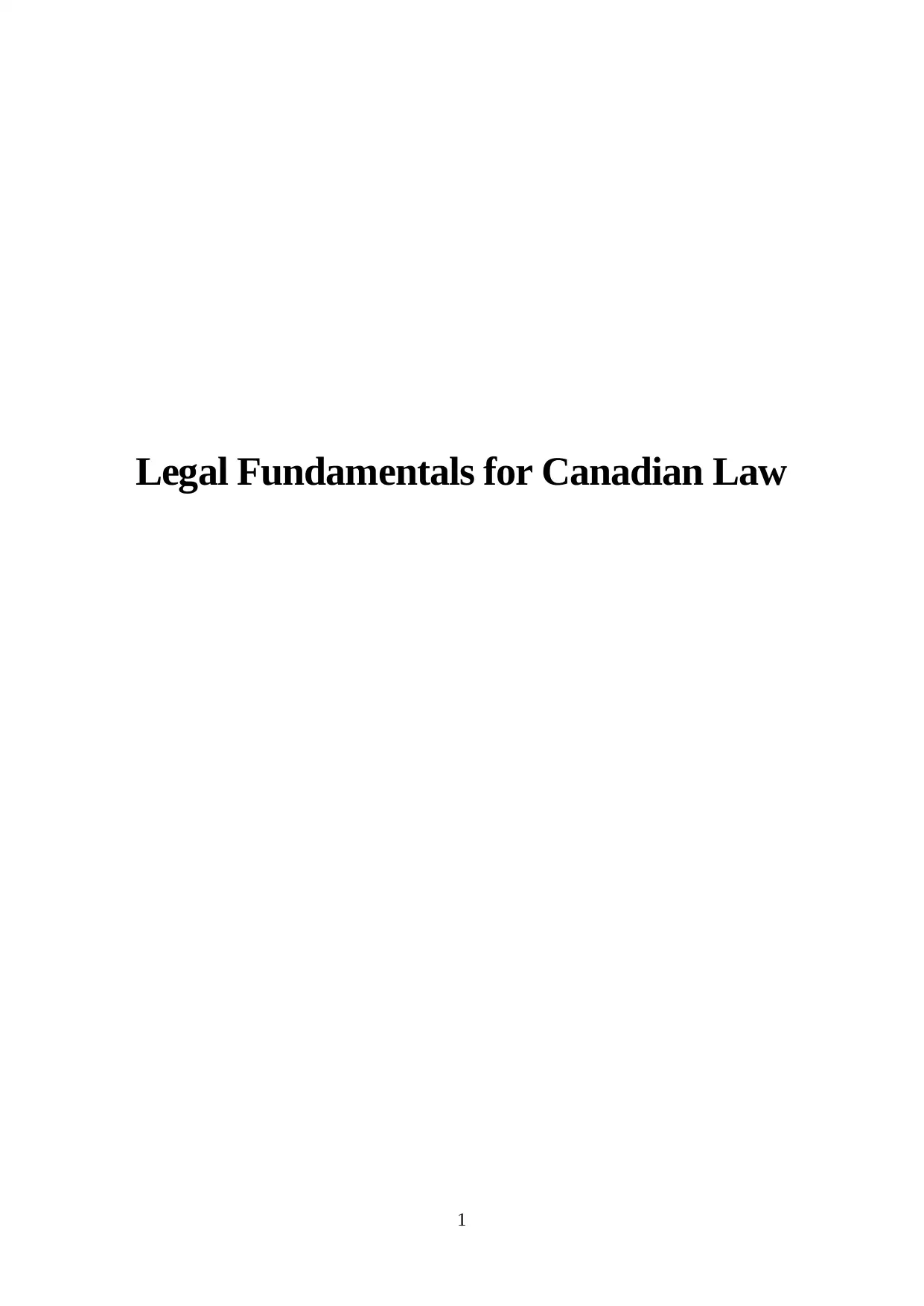
Legal Fundamentals for Canadian Law
1
1
Paraphrase This Document
Need a fresh take? Get an instant paraphrase of this document with our AI Paraphraser
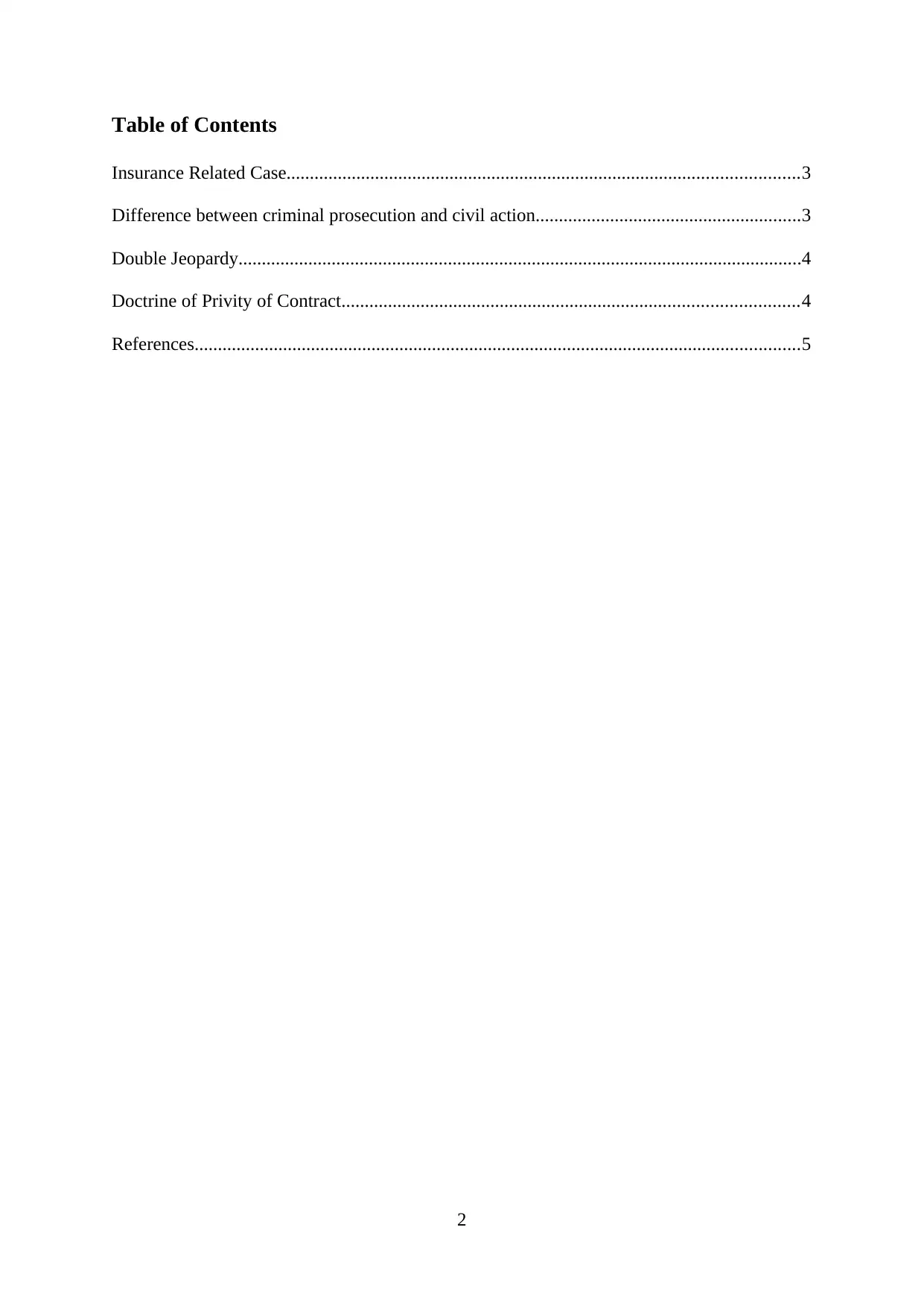
Table of Contents
Insurance Related Case..............................................................................................................3
Difference between criminal prosecution and civil action.........................................................3
Double Jeopardy.........................................................................................................................4
Doctrine of Privity of Contract..................................................................................................4
References..................................................................................................................................5
2
Insurance Related Case..............................................................................................................3
Difference between criminal prosecution and civil action.........................................................3
Double Jeopardy.........................................................................................................................4
Doctrine of Privity of Contract..................................................................................................4
References..................................................................................................................................5
2
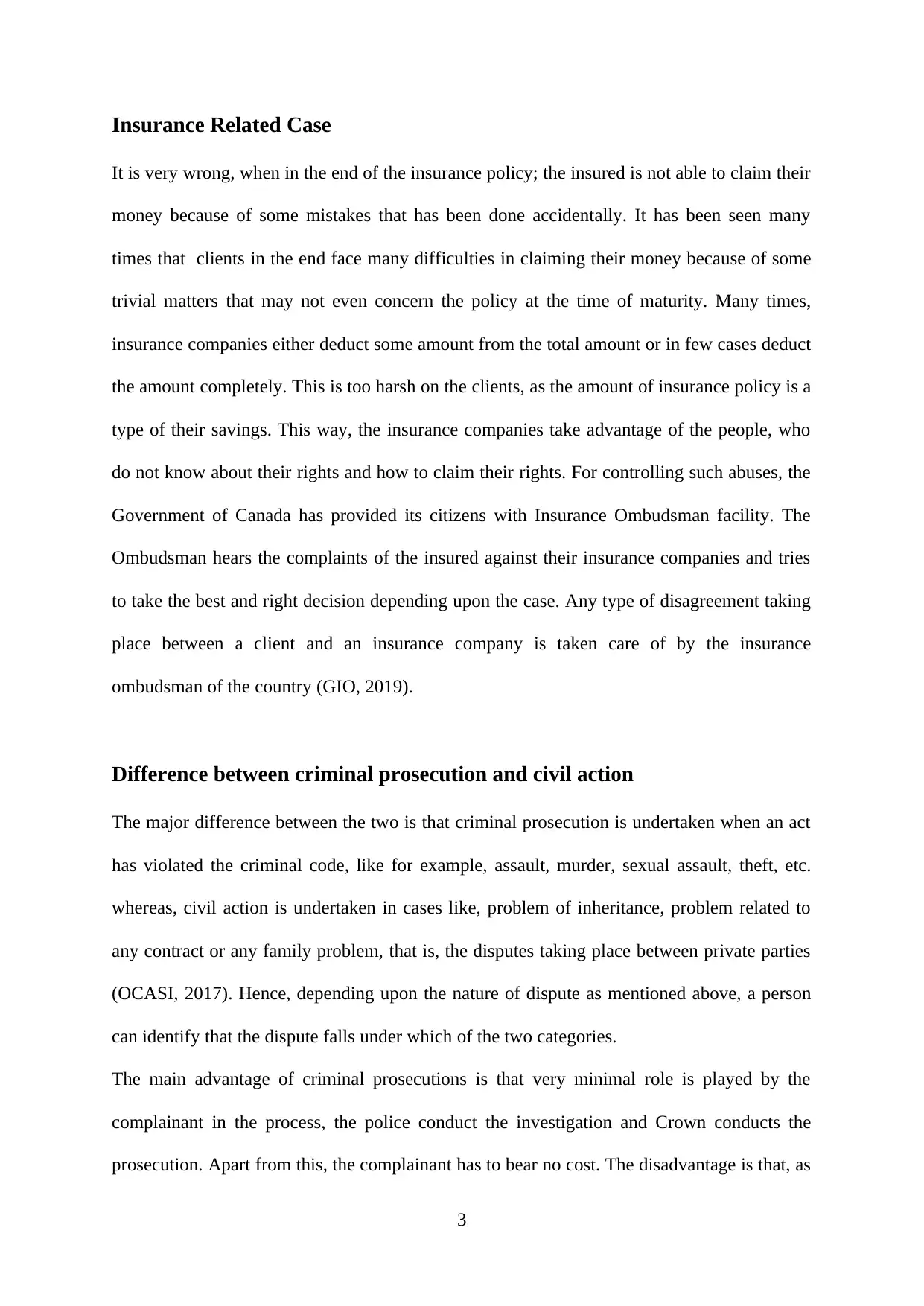
Insurance Related Case
It is very wrong, when in the end of the insurance policy; the insured is not able to claim their
money because of some mistakes that has been done accidentally. It has been seen many
times that clients in the end face many difficulties in claiming their money because of some
trivial matters that may not even concern the policy at the time of maturity. Many times,
insurance companies either deduct some amount from the total amount or in few cases deduct
the amount completely. This is too harsh on the clients, as the amount of insurance policy is a
type of their savings. This way, the insurance companies take advantage of the people, who
do not know about their rights and how to claim their rights. For controlling such abuses, the
Government of Canada has provided its citizens with Insurance Ombudsman facility. The
Ombudsman hears the complaints of the insured against their insurance companies and tries
to take the best and right decision depending upon the case. Any type of disagreement taking
place between a client and an insurance company is taken care of by the insurance
ombudsman of the country (GIO, 2019).
Difference between criminal prosecution and civil action
The major difference between the two is that criminal prosecution is undertaken when an act
has violated the criminal code, like for example, assault, murder, sexual assault, theft, etc.
whereas, civil action is undertaken in cases like, problem of inheritance, problem related to
any contract or any family problem, that is, the disputes taking place between private parties
(OCASI, 2017). Hence, depending upon the nature of dispute as mentioned above, a person
can identify that the dispute falls under which of the two categories.
The main advantage of criminal prosecutions is that very minimal role is played by the
complainant in the process, the police conduct the investigation and Crown conducts the
prosecution. Apart from this, the complainant has to bear no cost. The disadvantage is that, as
3
It is very wrong, when in the end of the insurance policy; the insured is not able to claim their
money because of some mistakes that has been done accidentally. It has been seen many
times that clients in the end face many difficulties in claiming their money because of some
trivial matters that may not even concern the policy at the time of maturity. Many times,
insurance companies either deduct some amount from the total amount or in few cases deduct
the amount completely. This is too harsh on the clients, as the amount of insurance policy is a
type of their savings. This way, the insurance companies take advantage of the people, who
do not know about their rights and how to claim their rights. For controlling such abuses, the
Government of Canada has provided its citizens with Insurance Ombudsman facility. The
Ombudsman hears the complaints of the insured against their insurance companies and tries
to take the best and right decision depending upon the case. Any type of disagreement taking
place between a client and an insurance company is taken care of by the insurance
ombudsman of the country (GIO, 2019).
Difference between criminal prosecution and civil action
The major difference between the two is that criminal prosecution is undertaken when an act
has violated the criminal code, like for example, assault, murder, sexual assault, theft, etc.
whereas, civil action is undertaken in cases like, problem of inheritance, problem related to
any contract or any family problem, that is, the disputes taking place between private parties
(OCASI, 2017). Hence, depending upon the nature of dispute as mentioned above, a person
can identify that the dispute falls under which of the two categories.
The main advantage of criminal prosecutions is that very minimal role is played by the
complainant in the process, the police conduct the investigation and Crown conducts the
prosecution. Apart from this, the complainant has to bear no cost. The disadvantage is that, as
3
⊘ This is a preview!⊘
Do you want full access?
Subscribe today to unlock all pages.

Trusted by 1+ million students worldwide
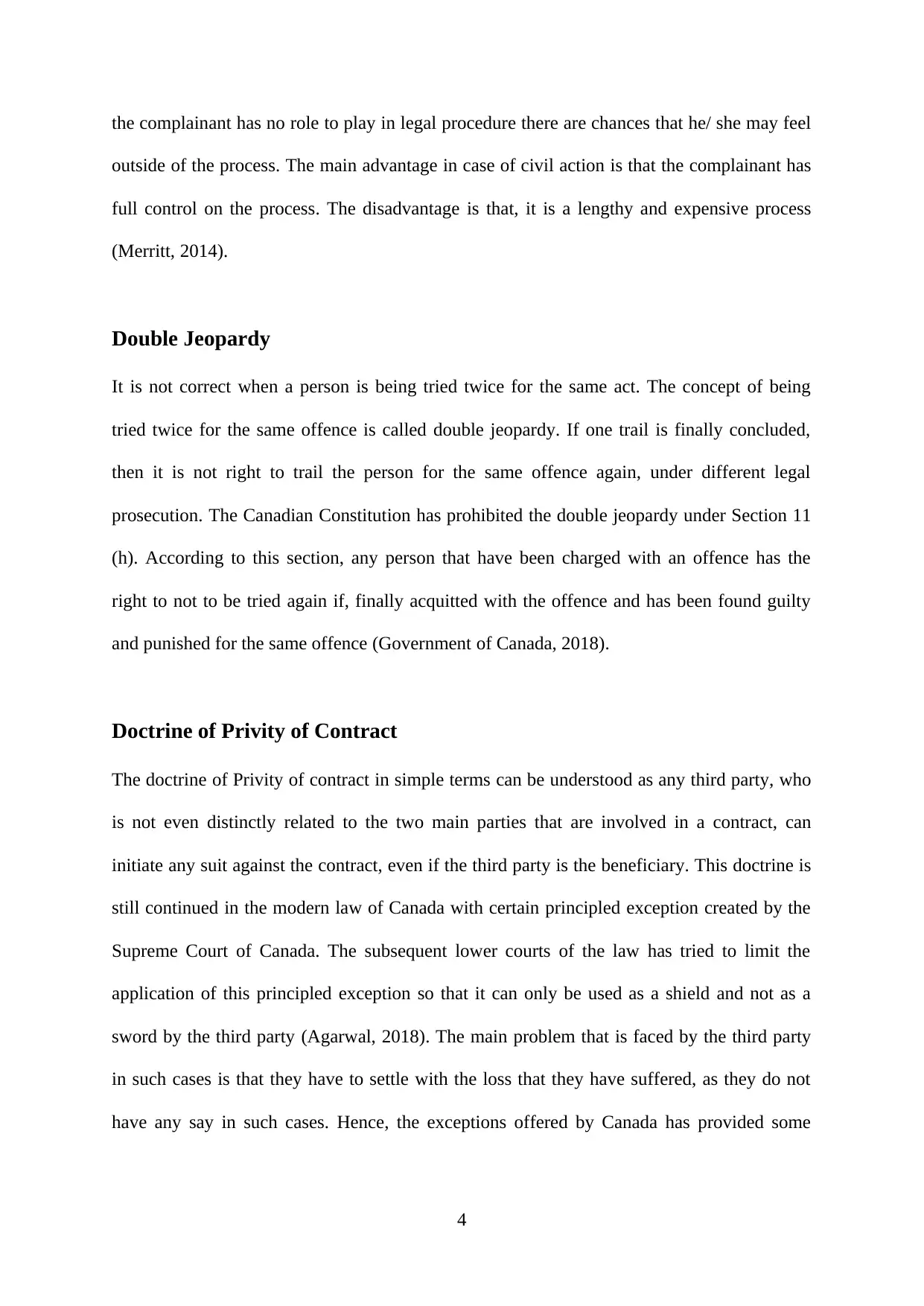
the complainant has no role to play in legal procedure there are chances that he/ she may feel
outside of the process. The main advantage in case of civil action is that the complainant has
full control on the process. The disadvantage is that, it is a lengthy and expensive process
(Merritt, 2014).
Double Jeopardy
It is not correct when a person is being tried twice for the same act. The concept of being
tried twice for the same offence is called double jeopardy. If one trail is finally concluded,
then it is not right to trail the person for the same offence again, under different legal
prosecution. The Canadian Constitution has prohibited the double jeopardy under Section 11
(h). According to this section, any person that have been charged with an offence has the
right to not to be tried again if, finally acquitted with the offence and has been found guilty
and punished for the same offence (Government of Canada, 2018).
Doctrine of Privity of Contract
The doctrine of Privity of contract in simple terms can be understood as any third party, who
is not even distinctly related to the two main parties that are involved in a contract, can
initiate any suit against the contract, even if the third party is the beneficiary. This doctrine is
still continued in the modern law of Canada with certain principled exception created by the
Supreme Court of Canada. The subsequent lower courts of the law has tried to limit the
application of this principled exception so that it can only be used as a shield and not as a
sword by the third party (Agarwal, 2018). The main problem that is faced by the third party
in such cases is that they have to settle with the loss that they have suffered, as they do not
have any say in such cases. Hence, the exceptions offered by Canada has provided some
4
outside of the process. The main advantage in case of civil action is that the complainant has
full control on the process. The disadvantage is that, it is a lengthy and expensive process
(Merritt, 2014).
Double Jeopardy
It is not correct when a person is being tried twice for the same act. The concept of being
tried twice for the same offence is called double jeopardy. If one trail is finally concluded,
then it is not right to trail the person for the same offence again, under different legal
prosecution. The Canadian Constitution has prohibited the double jeopardy under Section 11
(h). According to this section, any person that have been charged with an offence has the
right to not to be tried again if, finally acquitted with the offence and has been found guilty
and punished for the same offence (Government of Canada, 2018).
Doctrine of Privity of Contract
The doctrine of Privity of contract in simple terms can be understood as any third party, who
is not even distinctly related to the two main parties that are involved in a contract, can
initiate any suit against the contract, even if the third party is the beneficiary. This doctrine is
still continued in the modern law of Canada with certain principled exception created by the
Supreme Court of Canada. The subsequent lower courts of the law has tried to limit the
application of this principled exception so that it can only be used as a shield and not as a
sword by the third party (Agarwal, 2018). The main problem that is faced by the third party
in such cases is that they have to settle with the loss that they have suffered, as they do not
have any say in such cases. Hence, the exceptions offered by Canada has provided some
4
Paraphrase This Document
Need a fresh take? Get an instant paraphrase of this document with our AI Paraphraser
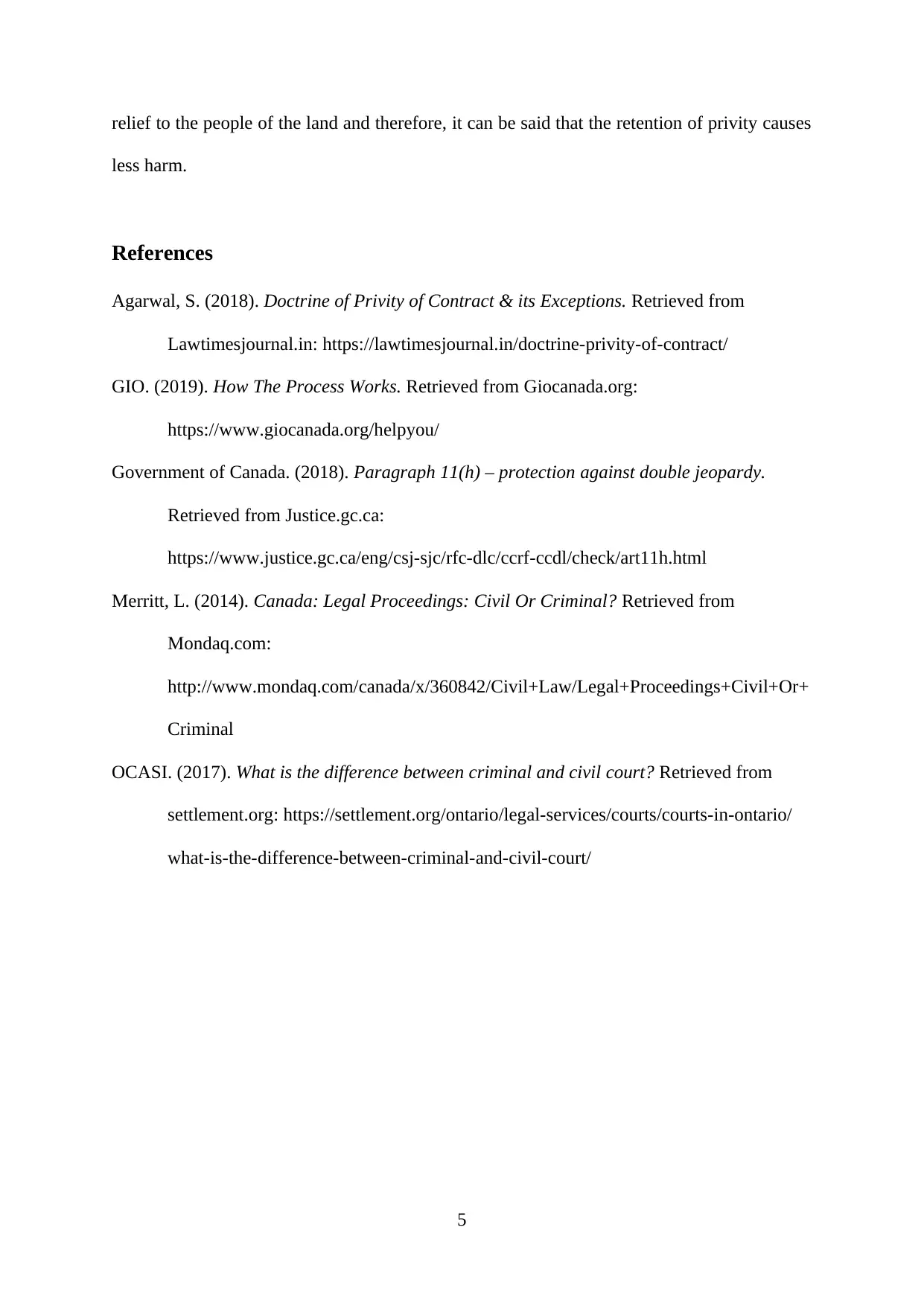
relief to the people of the land and therefore, it can be said that the retention of privity causes
less harm.
References
Agarwal, S. (2018). Doctrine of Privity of Contract & its Exceptions. Retrieved from
Lawtimesjournal.in: https://lawtimesjournal.in/doctrine-privity-of-contract/
GIO. (2019). How The Process Works. Retrieved from Giocanada.org:
https://www.giocanada.org/helpyou/
Government of Canada. (2018). Paragraph 11(h) – protection against double jeopardy.
Retrieved from Justice.gc.ca:
https://www.justice.gc.ca/eng/csj-sjc/rfc-dlc/ccrf-ccdl/check/art11h.html
Merritt, L. (2014). Canada: Legal Proceedings: Civil Or Criminal? Retrieved from
Mondaq.com:
http://www.mondaq.com/canada/x/360842/Civil+Law/Legal+Proceedings+Civil+Or+
Criminal
OCASI. (2017). What is the difference between criminal and civil court? Retrieved from
settlement.org: https://settlement.org/ontario/legal-services/courts/courts-in-ontario/
what-is-the-difference-between-criminal-and-civil-court/
5
less harm.
References
Agarwal, S. (2018). Doctrine of Privity of Contract & its Exceptions. Retrieved from
Lawtimesjournal.in: https://lawtimesjournal.in/doctrine-privity-of-contract/
GIO. (2019). How The Process Works. Retrieved from Giocanada.org:
https://www.giocanada.org/helpyou/
Government of Canada. (2018). Paragraph 11(h) – protection against double jeopardy.
Retrieved from Justice.gc.ca:
https://www.justice.gc.ca/eng/csj-sjc/rfc-dlc/ccrf-ccdl/check/art11h.html
Merritt, L. (2014). Canada: Legal Proceedings: Civil Or Criminal? Retrieved from
Mondaq.com:
http://www.mondaq.com/canada/x/360842/Civil+Law/Legal+Proceedings+Civil+Or+
Criminal
OCASI. (2017). What is the difference between criminal and civil court? Retrieved from
settlement.org: https://settlement.org/ontario/legal-services/courts/courts-in-ontario/
what-is-the-difference-between-criminal-and-civil-court/
5
1 out of 5
Your All-in-One AI-Powered Toolkit for Academic Success.
+13062052269
info@desklib.com
Available 24*7 on WhatsApp / Email
![[object Object]](/_next/static/media/star-bottom.7253800d.svg)
Unlock your academic potential
Copyright © 2020–2026 A2Z Services. All Rights Reserved. Developed and managed by ZUCOL.
